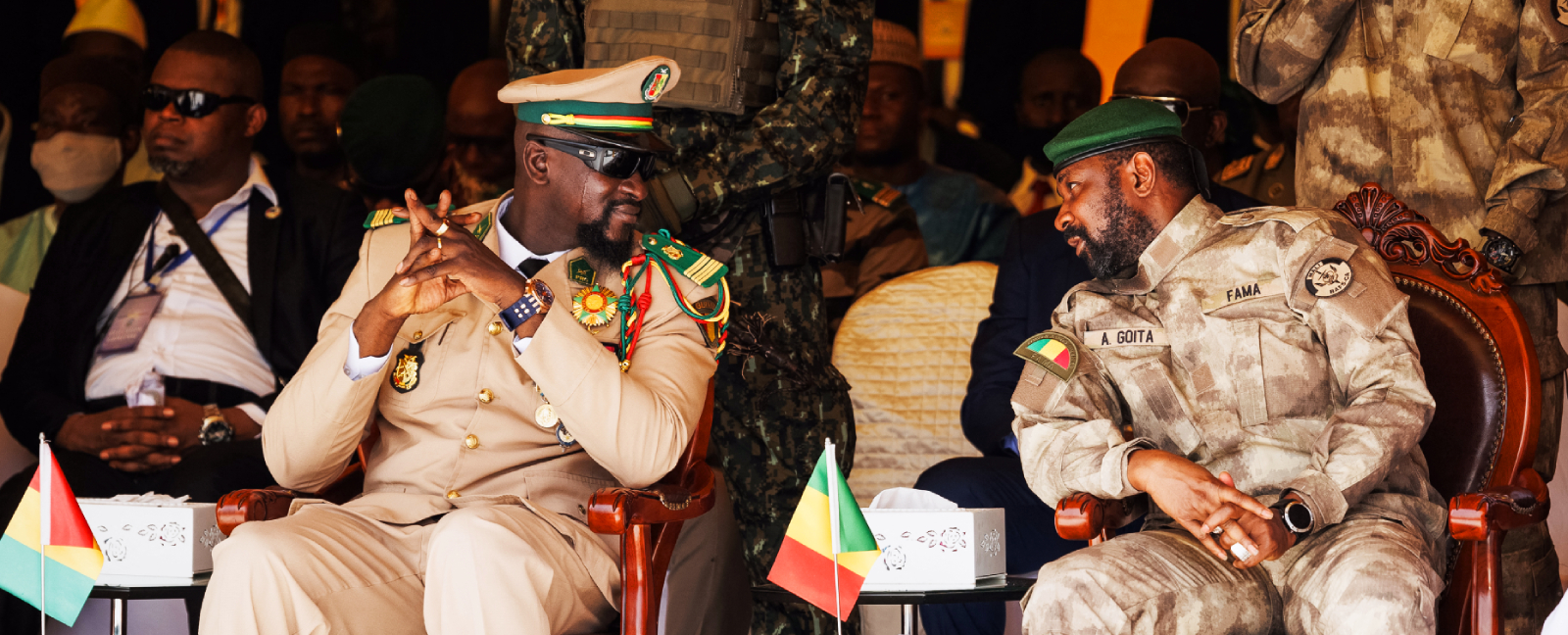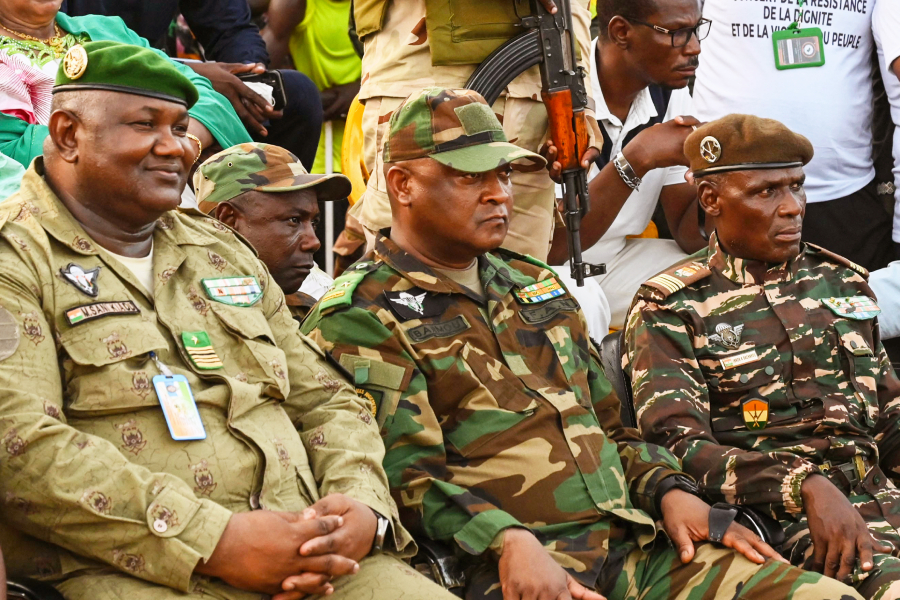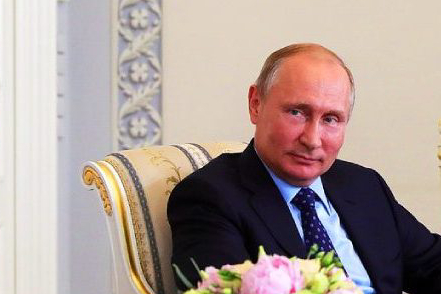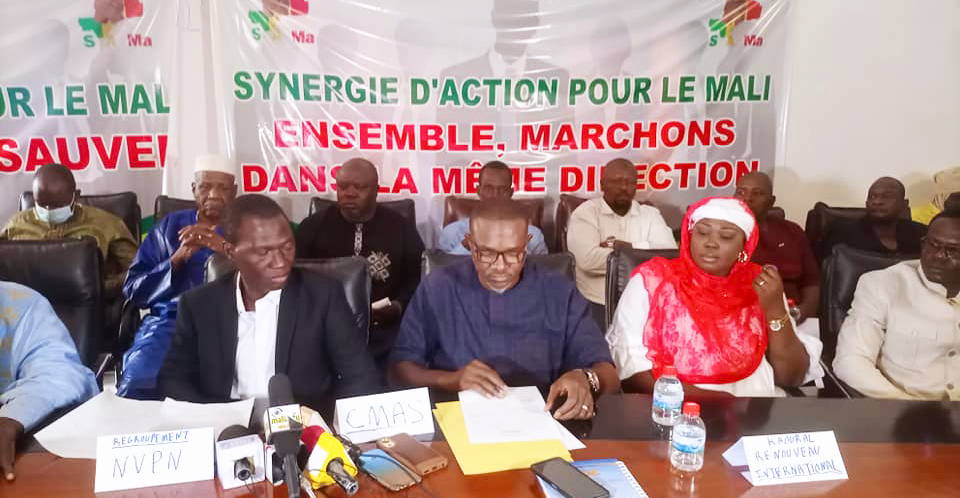
Junta leaders Colonel Mamady Doumbouya, Guinea (left), and Colonel Assimi Goïta, Mali, attending a military parade. (Photo: AFP/Ousmane Makaveli)
An alarming string of military coups across the Sahel in recent years has significantly reshaped the political landscape in this important and highly volatile region—arguably the most unstable stretch of territory in the world today. And the stakes continue to rise.
This fact was vividly illustrated by a demand from the Nigerien junta in April that the United States withdraw the 1,000 troops stationed there to help counter violent extremism. This follows the forced departures of French, European Union, and United Nations peacekeeping forces, as well as troops from neighboring countries supporting regional security efforts.
In response to this “loss of influence,” an increasing number of analysts and policymakers in Washington and Europe have called for Western governments to accommodate the juntas as a means of retaining “access.” Presented as pragmatic realism, the argument goes as follows: If the West recognizes the military juntas as legitimate and tolerates their heavy-handedness, then this might keep the door open to greater cooperation and perhaps a more effective response to the extremist insurgency.
Not only is this rationale faulty, but its entire calculus is counterproductive to the very security interests that Western governments aim to protect—namely, countering violent extremism, slowing instability-induced migration flows to Europe, and providing a counterbalance to Russia’s profound authoritarian influence.
Junta Interests Are Not the Same as National Interests

Leaders of Niger’s military junta: Colonel Mamane Sani Kiaou (L), General Moussan Salaou Barmou (C), and Colonel Ibroh Bachirou (2-R). (Photo: AFP)
Many analyses of this region characterize the dissolution of regional and international security agreements as “Mali,” “Burkina Faso,” and “Niger” wanting a different relationship with the West. Yet these sudden shifts in posture are entirely linked to the power grabs by the juntas in 2020, 2022, and 2023, respectively. These dramatic swings in position are better understood as an embodiment of the respective juntas’ interests, which are based solely on maintaining power, not national interests. It is not surprising, for example, that each junta seized control from democratically-elected governments with lofty populist promises, including reform and elections, only to resort to violence and intimidation against citizens that dissent while postponing any electoral process that may threaten their stranglehold on power.
It is important to recall that Western countries had been working closely with democratically elected governments in Niger, Burkina Faso, and Mali for more than a decade to help counter violent extremist groups while investing in development priorities and creating more accountable governance institutions.
In response to the threats from militant Islamist groups, security support from countries in the region—as well as the UN, EU, and United States—was ramping up from the more than 26,000 troops already deployed in Mali, Burkina Faso, and Niger. And development investments, amounting to upwards of 40 percent of government budgets, saw median per capita incomes of the three countries grow by 19 percent in the decade before their coups. What is more, all three countries saw improvements in their UN Human Development Index scores over this same period.
Each junta seized power with lofty populist promises only to resort to violence and intimidation against citizens that dissent while postponing any electoral process.
Democratic systems in these countries—though they were nascent and far from ideal—also fostered more transparency and a decrease in government corruption. Auditing practices implemented under Niger’s democratic government, for example, exposed that almost 40 percent of defense-procurement contracts were lost due to inflated costs or materiel that was not delivered. In Burkina Faso, investigations by the independent anticorruption body led to the arrest of a former defense minister.
Non-trivially, all three Sahelian countries had been dominated by military governments in the decades since independence prior to their democratic openings.
It is thus a revealing paradox that today’s juntas are pushing away regional and international partners as national security threats surge, and economic challenges remain paramount. The central question is why?
Russia as a Disruptor
 Russia has had an active and not-so-subtle hand in coups in each of these three countries, which were preceded by at least a year of intensive disinformation aimed at destabilizing the democratically elected governments in place. Following the coups, Russia was quick to recognize the juntas, provide political cover on the international stage, and continue the torrent of disinformation—now aimed at touting the perceived popularity of the juntas.
Russia has had an active and not-so-subtle hand in coups in each of these three countries, which were preceded by at least a year of intensive disinformation aimed at destabilizing the democratically elected governments in place. Following the coups, Russia was quick to recognize the juntas, provide political cover on the international stage, and continue the torrent of disinformation—now aimed at touting the perceived popularity of the juntas.
Russia has also deployed between a hundred and a thousand mercenaries from the Wagner Group or its successor, Africa Corps, in each country—paid for by the juntas with both cash and access to critical minerals and gold mines. Moscow justifies these deployments under the guise of “security cooperation,” though the real objective is to keep these pliable regimes in power as a pivotal lever of Russian influence. Critical to understanding this equation is that Russia is decidedly not investing capital, trade, or development assistance into these countries.
This is because Russia’s interests are entirely political. By co-opting the juntas with assurances that the Kremlin will help them to retain power at all costs, Russia can tout its expanding influence and demonstrate that it still has willing international partners despite its isolation from the West.
This arrangement works well for both Moscow and the juntas. This comes at the expense of citizens of these countries, however, who must pay the price for this geostrategic posturing.
Implications for the Sahel
While the juntas justify their coups—and continued strongman rule—based on the claim that they are uniquely able to restore security, episodes of violence linked to militant Islamist groups have doubled since these militaries have seized power. Fatalities have tripled. The security vacuum created when UN, regional, and international forces were forced to withdraw has been predictably filled by violent militant groups.
Actions taken by the military juntas have been highly traumatic for citizens at home and destabilizing for an already volatile region.
Reports of human rights abuses committed by the juntas against their citizens have also increased. Human Rights Watch reported that the Burkina Faso military killed 223 people in the villages of Nodin and Soro, including 56 children, in February. The junta subsequently expelled international news organizations reporting on the story, including the Voice of America and BBC. There have also been regular reports of atrocities perpetrated by the Malian military and its Russian patrons, including an incident where 500 unarmed villagers were massacred with impunity.
This growing insecurity is driving more migration. There are now more than 3 million refugees and internally displaced people in these three countries alone. Whereas Niger’s civilian government tried to discourage migrants from making the treacherous trek to the Mediterranean, today military escorts are organized for migrant convoys—leading them into the hands of notoriously abusive human traffickers in Libya.
Reflecting the deteriorating living conditions, the Nigerien junta has now missed four debt payments and defaulted on $519 million in debt. The junta in Mali has similarly been struggling to keep the electricity on, with some parts of the capital, Bamako, faced with power outages of more than 12 hours a day. This economic mismanagement is compounded by a lack of government transparency. In February, the Nigerien junta abrogated oversight laws that require transparent accounting of the defense sector—a key reform undertaken during Niger’s democratic opening prior to the 2023 coup.

Launch of “Synergy of Action for Mali,” a coalition of 30 political parties and protest associations that aims to offer an alternative to the current military government, prior to the suspension of all political activity “until further notice.”
Absent any semblance of functioning democratic institutions, citizens and independent media have limited space to call attention to these abuses of power. Dissent is not tolerated by the military government, nor are basic human rights like freedom of speech. Opposition-party leaders, journalists, and civil society activists are intimidated, often jailed on trumped-up charges, tortured, and disappeared. In Burkina Faso, journalists and other critics of the junta have been forcibly conscripted and sent to the frontlines as part of the regime’s mobilization initiative. The democratically elected President of Niger remains under house arrest despite numerous calls for his release and reinstatement. In April, the Malian junta issued a decree that suspended the activities of all political parties and associations “until further notice.” The juntas, meanwhile, have repeatedly ignored their own timelines for transitioning back to civilian rule.
In short, the actions taken by the military juntas have been highly traumatic for citizens at home and destabilizing for an already volatile region. Instead of ushering in promised “stability” and “reform,” the juntas have greatly amplified instability and opacity.
Accommodate to What End?
The realist proposition is that Western countries need to prioritize short-term security and economic interests above democratic values and principles. Today, in the case of the Sahelian juntas, it is hard to see how these interests are being advanced—even in the short term. Security, economic, and migration interests have all deteriorated under military rule. And the compromises made by ECOWAS and the West have only emboldened these regimes. Further accommodation of the juntas will only exacerbate these trends while enabling the juntas—including would-be coup leaders elsewhere—in their primary objective: to hold onto power indefinitely and at all costs.
Validating the juntas also plays directly into Russia’s hands. Co-opting the juntas has been Russia’s primary means of gaining influence in the Sahel. In its wake, Russia has left a trail of instability—the costs of which will be borne by citizens of the affected countries, the broader region, and in Europe for years to come. The West should not make matters worse by adopting the facile calls for accommodating the juntas—which, lacking resources and political legitimacy, have a tenuous hold on power at best.
Even if accommodation proved to be a propitious endeavor, the harm it would do to Western credibility cannot be ignored, nor its ramifications discounted. The gap between Western rhetoric on supporting Africans’ democratic aspirations and their lived reality lowers expectations for and democratic standards accepted on the continent. This approach also alienates the very actors and governments on which reliable partnerships can be sustained.
Prospects for stability and economic progress for the region are far better with democratic governments.
The Sahel is a case where interests and values align. Prospects for stability and economic progress for the region are far better with democratic governments that are committed to their citizens as well as advancing transparency and the rule of law. On this, the historical track record and the mounting evidence from the Sahelian juntas concur. Democratic governments would also be much more focused on rebuilding regional security partnerships to address the ever present and growing security threats.
Rather than placating the juntas—and their repressive, undemocratic rule—Western governments should apply pressure on them to uphold their commitments to transition back to civilian rule while recognizing the courageous efforts of opposition parties, civil society activists, and journalists who continue to put their lives on the line to amplify the democratic demands of citizens.
This is not to say that the West should not keep open lines of communication with Sahelian militaries. It is important to note that military institutions are not monolithic entities. Indeed, many officers in each of these militaries were not supportive of the coups and have only cooperated under pressure and as a means of showing solidarity with their brothers in arms. What is more, professional militaries will play a vital role in reestablishing security under democratic governments once a transition happens.
Yet, in a resource-constrained environment, security and development funds intended for the coup-affected countries should be redirected elsewhere on the continent with governments that came to power through legal means—in other words, free and fair elections—and are therefore more committed to security and prosperity for their citizens while also having a much better track record of doing so.
In addition to being more pragmatic, this approach offers a proactive imperative. Just as Russia fomented dissent against democratically elected governments in Mali, Burkina Faso, and Niger as an entry point for its authoritarian influence, Moscow is now targeting other democratically oriented governments with unrelenting disinformation campaigns. This has been seen in Côte d’Ivoire, Senegal, Ghana, and Nigeria, among others. These governments should not face this onslaught alone.
The West should not play into Russia’s hands by validating its disruptive and destabilizing subterfuge—nor sacrifice its principles for the sake of accommodation—by sidling up to and further enabling the juntas that the Kremlin has in its pocket.
Dr. Joseph Siegle is the Director of Research at the Africa Center for Strategic Studies.
Jeffrey Smith is the founding director of the nonprofit organization Vanguard Africa.
This article is republished from The Journal of Democracy. Read the original article here.
Additional Resources
- Africa Center for Strategic Studies, “Niger Coup Reversing Hard-Earned Gains,” Infographic, May 13, 2024.
- Africa Center for Strategic Studies, “Assessing Mali’s Non-Transition,” Infographic, February 2, 2024.
- Daniel Eizenga and Katie Nodjimbadem, “Chad’s Constitutional Referendum Promises a Transition without Change—or Stability,” Spotlight, Africa Center for Strategic Studies, November 28, 2023.
- Dan Kuwali, “Oversight and Accountability to Improve Security Sector Governance in Africa,” Africa Security Brief No. 42, Africa Center for Strategic Studies, September 2023.
- Africa Center for Strategic Studies, “Burkina Faso Crisis Continues to Spiral,” Infographic, August 29, 2023.
- Joseph Siegle, “The Creeping Loss of African Sovereignty,” Spotlight, Africa Center for Strategic Studies, February 8, 2023.
- Africa Center for Strategic Studies, “Term Limit Evasions and Coups in Africa: Two Sides of the Same Coin,” Infographic, October 24, 2023.
- Joseph Siegle, “Africa’s Coups and the Role of External Actors,” Italian Institute for International Political Studies, December 17, 2021.
- Africa Center for Strategic Studies, “Autocracy and Instability,” Infographic, March 9, 2021.
- Joseph Siegle and Daniel Eizenga, “Beware the Popular Coup,” AllAfrica.com, August 30, 2020.

